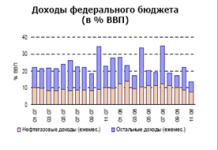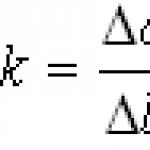15.02.19
The Ministry of Finance introduced the IFRS document “Definition of a business (amendments to IFRS 3)” on the territory of the Russian Federation (order dated January 22, 2019 N 11n). The standard can be applied voluntarily from February 24. Amendments to IFRS 3 Business Combinations have clarified the term “business”. It is now an integrated set of activities and assets, the conduct and management of which can lead to the provision of goods or services... 69815.02.19
On the entry into force in the Russian Federation of IFRS "Definition of a business (Amendments to IFRS 3)" 72615.02.19
Amendments to IFRS 3 Business Combinations 78414.12.18
The Ministry of Finance published a positive conclusion based on the results of the examination of the applicability of the IFRS document “Definition of a Business (amendments to IFRS 3)” in the Russian Federation. Another “popular sign” of the upcoming introduction of the document in the Russian Federation is that it is also included in the regularly updated plate of the Ministry of Finance “Information on the progress of the recognition of IFRS and their explanations for application in the territory of the Russian Federation.” For now - with an indication only of the results of the same examination. From the IFRS Foundation document... 93121.11.18
The Ministry of Finance put into effect on the territory of the Russian Federation the IFRS document “Amendments to references to the “Conceptual Framework” in IFRS standards (Amendments to IFRS standards)” (order dated October 30, 2018 N 220n). The document includes sections: Amendments to IFRS 2 Share-based Payment Amendments to IFRS 3 Business Combinations Amendments to IFRS 6 Exploration for and Evaluation of Mineral Reserves Amendments to IFRS 14 "Delayed accounts... 62820.11.18
On amendments to a number of IFRSs in connection with the adoption of the “Conceptual Framework for the Presentation of Financial Statements” 53204.10.18
In Russia, it is planned to introduce the IFRS document “Amendments to references to the “Conceptual Framework” in IFRS standards (Amendments to IFRS standards).” The Ministry of Finance submitted the corresponding draft order for public discussion. ... 71202.08.18
By Order No. 153n dated July 12, 2018, the Ministry of Finance introduced the IFRS document “Amendments to the program, reduction of the program or repayment of obligations under the program” on the territory of the Russian Federation. These are amendments to IAS 19 Employee Benefits. The amendments relate to the cost of services of the current period, the net interest on the net liability (asset) of the program, and income from interest on program assets. The order of the Ministry of Finance will come into force on August 11.... 116802.08.18
Amendments to IAS 19 Employee Benefits 109702.08.18
On the entry into force in the Russian Federation of the IFRS document on program changes - amendments to IAS 19 83423.04.18
Annual improvements to IFRS for the period 2015-2017 149223.04.18
Amendments to IAS 28 Investments in Associates and Joint Ventures 83723.04.18
Amendments to IFRS 9 Financial Instruments 88119.04.18
By Order No. 56n dated March 27, 2018, the Ministry of Finance puts three IFRS documents into effect on the territory of the Russian Federation: “Annual improvements to IFRS, period 2015 - 2017.” "Long-term investments in associates and joint ventures (amendments to IAS 28)"; “Prepayment Provisions with Potential Negative Recovery (Amendments to IFRS 9).” The order will come into force on April 28. ... 107501.02.18
The other day, the Ministry of Finance published on its website the texts of the IFRS documents currently used in the Russian Federation, most of which, in an updated form, were put into effect on the territory of the Russian Federation by Order of the Ministry of Finance dated December 28, 2015 No. 217n, however, many of them have already undergone a number of changes since then . In addition, the department provided a new version of the Conceptual Framework in Russian. Here is a complete list of documents published by the Ministry of Finance with links: ... 215421.12.17
On changes made to the chart of accounts of credit institutions taking into account the requirements of IFRS 9 129521.12.17
On clarifying the procedure for determining income, expenses and other total income of banks 94721.12.17
On the scope of application of the regulation on the accounting procedure for derivative financial instruments 71814.12.17
The International Accounting Standards Board (IASB) today presented its traditional collection of annual improvements to IFRS standards for the period from 2015 to 2017. As usual, these are relatively small-scale, narrowly focused adjustments (in this case to four standards), which do not significantly change their essence. For the IASB, this is an example of fulfilling one of its main responsibilities to maintain international standards for... 85828.06.17
The IFRS Foundation has published a draft version of the new guidance to IFRS standards for small and medium-sized enterprises, inviting everyone to comment on it. The document was developed by the working group for the implementation of standards “IFRS for SMEs” - SMEIG (SME Implementation Group). The guidance is non-binding and is a collection of questions and answers that are devoted to the accounting of financial guarantees issued by the parent organization in... 85516.06.17
At its upcoming meeting this month, the IASB will discuss and decide whether to greenlight the provision on the topic of contractual obligations in the interim practice guidance, Making Materiality Judgments. It was first presented back in October 2015 - and, in theory, should someday become the basis on which judgments about the materiality of information will be made with significant... 63114.06.17
The next meeting of the ASAF International Consultative Forum will be held on July 6-7 in London. The IASB has identified topics for upcoming discussions: “Disclosure Initiative” – discussion document “Disclosure Principles”; goodwill and impairment - discussion of a research publication from the Japanese ASBJ; fixed assets – discussion of the upcoming publication of changes to IAS 16; improvements to IFRS 8 “Operating Segments” standards... 41826.04.17
The European Financial Reporting Advisory Group has released a draft of its comment letter on the improvements to IFRS 8 Operating Segments (and IAS 34), which the IASB introduced on 29 March. The comment period on these has not yet expired, so everyone has until July 31st to submit their comments. Let us briefly recall what the IASB proposed: Companies want to be required to disclose their position in their reporting... 50107.04.17
By Order No. 50n dated March 30, 2017, the Ministry of Finance put into effect on the territory of the Russian Federation the IFRS document “Application of IFRS 9 “Financial Instruments” together with IFRS 4 “Insurance Contracts” (amendments to IFRS 4).” On April 3, the order was sent for registration to the Ministry of Justice, as follows from the information on the department’s website. So far, state registration has not taken place. Let us remind you that the contents of this order were previously reported at the project stage. ... 91423.03.17
As part of its traditional triennial review of key UK standard FRC 102, the Financial Reporting Council (FRC) today introduced a series of corrective, simplifying amendments. Among other things, it includes a new approach to accounting for loans in favor of company directors. The main goal of the developers was to ensure greater cost efficiency in applying the standard in practice. Paul George (Paul... 48017.01.17
The European Financial Reporting Advisory Group has presented its final recommendations on the joint application of IFRS 9 Financial Instruments and IFRS 4 Insurance Contracts in the EU. According to experts, in the specific circumstances arising from differences in the effective dates of the two new standards, the changes made in this case meet all the requirements for the application of IFRS in Europe.... 63413.01.17
The IASB yesterday published proposed changes to three standards, thereby launching consultations as part of its traditional annual improvements. The standards in question are IAS 12 Income Taxes, IAS 23 Borrowing Costs and IAS 28 Investments in Associates and Joint Ventures. In the first case, the developer clarifies that the reporting organization is obliged to take into account all tax consequences of the dividend policy... 62820.12.16
By Order No. 215n dated November 23, 2016, the Ministry of Finance introduced the IFRS document “Classification and measurement of share-based payment transactions (amendments to IFRS 2)” on the territory of the Russian Federation. The document comes into force in the Russian Federation for voluntary use - from the date of its official publication; for mandatory application - within the time limits specified in this document. ... 63319.12.16
Amendments to IFRS 2 Share-based Payment adopted 135309.12.16
As part of its standard responsibilities for maintaining the appropriate quality of international standards, the IASB yesterday issued clarifying amendments to several standards and one interpretation, namely: Annual Improvements to IFRS Technical Plans, correcting or eliminating a particular unnecessary word from the text; IFRIC 22 “Foreign Currency Transactions and Accounting for Advances” (the issue of choosing the exchange rate to account for transactions, ... 111906.12.16
A new document for the next IASB meeting in December was posted on the international developer's website. It will discuss such aspects of the new financial instruments standard as fair value prepayment options, symmetric make whole prepayment options and the SPPI test (“solely payments of ... 115018.11.16
The IASB has voted and decided on the official effective date for the new IFRS 17 Insurance Contracts standard, which should replace the current IFRS 4. This will be January 1, 2021. The international developer has rightly decided that if IFRS 17 is introduced where -in the first half of 2017, then by postponing the date of mandatory transition until the beginning of 2021, he will give companies 3.5-4 years to prepare. ... 91017.11.16
On changes to the industry standard for accounting for derivative financial instruments of non-financial financial institutions 69017.11.16
On accounting of transactions with securities in non-credit financial institutions 81414.10.16
The European Financial Reporting Advisory Group has launched a preliminary consultation on the adoption of the new IFRS 16 Leases standard in the EU, as evidenced by the published press release. Until December 8 of this year, there is an opportunity to speak out regarding the issues raised in the published document. IFRS 16 will replace the previous leasing standard (IAS 17) and all associated interpretations. One of the most... 75407.10.16
By Order No. 156n dated September 14, 2016, the Ministry of Finance puts into effect on the territory of the Russian Federation the IFRS document “Amendments to IFRS 15 “Revenue from Contracts with Customers”. The Order has already been registered with the Ministry of Justice. The standard, as usual, comes into force on territory of the Russian Federation for voluntary use - from the date of its official publication; for mandatory use - within the time limits specified in this document. ... 152207.10.16
Amendments to IFRS 15 “Revenue from Contracts with Customers” have been adopted. 123907.10.16
On the introduction into the Russian Federation of the IFRS document "Amendments to IFRS 15 "Revenue from contracts with customers" 108820.09.16
The American Financial Accounting Standards Board has made technical adjustments to the group of standards in section 606, united under the general heading “Revenue from contracts with customers.” They were first presented in May 2014 simultaneously with the publication of the standard of the same name from the IASB. On an ongoing basis, the American developer is implementing a project of technical adjustments and improvements to clarify standards or eliminate... 47804.08.16
The Ministry of Justice registered the order of the Ministry of Finance dated July 11, 2016 No. 111n, which puts into effect for application on the territory of the Russian Federation: IFRS 16 “Lease”; IFRS document “Disclosure Initiative (Amendments to IAS 7)”; IFRS document “Recognition of deferred tax assets for unrealized losses (amendments to IAS 12)”. The order will come into force on August 13. Then on the territory of the Russian Federation it will be stopped... 177904.08.16
Amendments to IAS 7 “Statement of Cash Flows” have been adopted 168104.08.16
Amendments to IAS 12 “Income Taxes” have been adopted 164020.07.16
Amendments to a number of IFRSs were adopted 83220.07.16
Amendments to IFRS 10 “Consolidated Financial Statements”, IFRS 12, IAS 28 were adopted 115320.07.16
Amendments to IFRS 7 “Financial Instruments: Disclosures” have been adopted 91920.07.16
Amendments to IFRS 11 Joint Arrangements and accompanying amendments to IFRS 1 adopted 90020.07.16
Amendments to IAS 16 “Property, Plant and Equipment” and IAS 38 “Intangible Assets” were adopted. 131320.07.16
13 IFRS documents are being introduced in Russia 261612.07.16
The latest annual review of the UK's core standard FRS 101, Condensed Disclosures, has just concluded and, in response to comments received, the FRC has provided general annual updates to it and an interim version of specific adjustments, sub-headed “Notification of shareholders”. shareholders." In any case, all changes made are limited in nature... 47530.06.16
As promised the other day, the IASB is introducing a fresh set of adjustments to IFRS 3 Business Combinations and IFRS 11 Joint Arrangements. The developer has clarified the definition of a business (there should now be no problem in applying guidance to ensure that a business is not confused with just a group of assets when applying IFRS 3) and the treatment of past holdings (if a company acquires... 109828.06.16
On Friday, the IFRS Foundation said that narrowly focused amendments to IFRS 3 Business Combinations and IFRS 11 Joint Arrangements are in the final stages of work. They are united under the common title Definition of a Business and Accountingf or Previously Held Interests, that is, “Definition of a business and accounting for past holdings.” It is under this title that the publication will be published on June 28. You can download it in the open... 52101.06.16
A draft order on the introduction of IFRS documents into force on the territory of the Russian Federation and on the recognition of certain orders of the Ministry of Finance as invalid has been submitted for public discussion. It is planned to put into effect: IFRS 9 “Financial Instruments” as amended in 2010; IFRS 9 Financial Instruments (Hedge Accounting and Amendments to IFRS 9, IFRS 7 and IAS 39); IFRS 9 Financial Instruments as amended in 2014; ... 116519.05.16
The International Accounting Standards Board has officially confirmed that it will make changes to the insurance contracts standard, IFRS 4. As a reminder, these long-debated changes are aimed at addressing potential problems that may arise from the transition to a different standard (IFRS 9 Financial Instruments). ) before IFRS 4 comes to replace the current insurance reporting procedure. Its decision is international... 53014.04.16
The International Accounting Standards Board has issued updates to IFRS 15 Revenue from Contracts with Customers, clarifying certain previously unclear requirements and providing additional relief to companies as they transition. The standard, we recall, first saw the light in mid-2014. No changes were made to its fundamental principles, but international developers did... 61110.03.16
The IFRS Foundation announced the start of sales yesterday of the new edition of the annual collection (one of the three main ones) 2016 International Financial Reporting Standards, for simplicity called the “Red Book” for the color of the cover. You can purchase it both electronically and in a printed version, or you can order a “set”, PDF + printed copy. Let us note, by the way, that this time the collection is divided into two parts, A and B. What's new? In fact, a little... 144910.02.16
The International Accounting Standards Board announced today that the newest version of the IFRS standard book (the so-called “Red Book”) is expected to be released in March. This volume includes all statutory IFRS standards that have an effective date after 1 January 2016. Therefore, compared to the previous version of 2015, the following changes can be found here: IFRS 16 “Rent”, IFRS 15 “Revenue from... 166309.02.16
By Order No. 217n dated December 28, 2015, the Ministry of Finance introduced new editions of 66 IFRS documents on the territory of the Russian Federation. The order was registered with the Ministry of Justice on February 2. The document was developed in order to recognize for application in the Russian Federation the new edition of IFRS texts previously put into effect on the territory of the Russian Federation, and combines provisions on the validity of IFRS documents in the Russian Federation - 40 IFRS and 26 clarifications. These are: IAS 1 Presentation of Financial Statements IFRS... 170609.02.16
New IFRSs have been introduced in Russia 650309.02.16
Just a few days ago, the IASB introduced an updated version of IAS 7 “Statement of Cash Flows”, which comes into force on January 1, 2017, but it is allowed to be used ahead of schedule. The British regulator, the Financial Reporting Council (FRC), warmly responded to the new version of the standard, which specifically for British accounting practice may be particularly useful in terms of disclosing debt... 65702.02.16
The FASB's Emerging Issues Task Force (EITS) has proposed a set of amendments to standards that govern the classification of cash flows received and paid in statements of cash flows. Numerous commentators have repeatedly pointed out to the American developer the discrepancies in accounting practices associated with classification and reflection... 60602.02.16
The International Accounting Standards Board has published amendments to IAS 7 Statement of Cash Flows. All changes are aimed at improving the quality of information about the financial activities of organizations that reaches investors. The changes come into force on January 1 of the following year, but early application is permitted. As a reminder, the Disclosure Initiative was added to the IASB work plan in 2013... 84528.01.16
On Tuesday, the American Accounting Standards Board tabled two sets of amendments designed to address pension reporting concerns. The first set of amendments affects the standards in Topic 715, Pension Benefits, and relates to the presentation of net periodic contributions for pensions and other post-retirement benefits. The problem with American reporting today is that... 68526.01.16
After the January meeting, the IASB updated its work plan, which took place for the penultimate time at the end of December. We remind you that due to the change in the presentation format in July last year, it is now difficult to track progress on individual projects, unless the progress is very significant. Since the previous adjustment, there have been few such projects, but they have existed. For large projects, changes in expectations can be noted... 52313.01.16
As promised, right on time, the IASB introduced the long-awaited new standard IFRS 16 Leases, which changes the requirements that have been in place for more than 30 years: they have already lost their relevance and are not perceived by almost anyone as an appropriate standard for leasing accounting by reporting preparers. As you know, leasing is a flexible source of financing, very important for most companies. However... 135125.12.15
The European Financial Reporting Advisory Group (EFRAG) has released an interim letter on the IASB's recent proposals. Let us remember that they relate to solving the problem of discrepancies in the dates of entry into force of two important standards – IFRS 9 “Financial Instruments” and large-scale updates to IFRS 4 for insurance contracts. I like the proposals of the international developer EFRAG. Experts believe that providing... 67618.12.15
On 11 December, the IFRS Transition Resource Group for Impairment of Financial Instruments, or simply “ITG,” held its third meeting on the impairment requirements in the new IFRS 9 Financial Instruments standard, which was released last year. Participants discussed the following key topics: the meaning of the current effective interest rate, conditional and other credit... 1 233211.12.15
The International Accounting Standards Board has published for public discussion its new amendments that change the current version of the IFRS 4 standard. The main task of the international developer is to resolve temporary difficulties in connection with the different dates of entry into force of the IFRS 9 “Financial Instruments” standard and the qualitative new standard for insurance contracts, which we are still waiting for. As you know, and released in... 59310.12.15
The IASB has published a set of minor adjustments to selected IFRS standards. This time they touched upon the following: Interim version of practical guidance on the application of the concept of materiality in financial statements (“Application of Materiality to Financial Statements”), which the IASB introduced relatively recently, at the end of October, IFRS 9 “Financial Instruments” IFRS ) 15 “Revenue from contracts with customers” ... 62225.11.15
The European Union has published an official decision of the European Commission regarding the implementation of updates to the standards IAS 16 “Fixed Assets” and IAS 41 “Agriculture”, according to which, we recall, biological assets with several production cycles must be accounted for as fixed assets. Directive of the European Commission (Commission Regulation (EC) No 2015/2113) dated November 23 amends the previous directive of 2008 (No... 85923.11.15
The IASB yesterday presented two new updates to the standards for discussion. The first is highly specialized amendments to IAS 40 Investment Property, clarifying the accounting for transfers to, or exclusion from, investment property (paragraph 57 of the standard). Among other things, many were interested in the case of property at the stage of construction or development - whether it can be transferred from... 58320.11.15
An anti-corruption examination of the draft order of the Ministry of Finance on the introduction of IFRS and clarifications of IFRS into force on the territory of the Russian Federation has begun and the invalidation of a number of orders of the Ministry of Finance on IFRS. The new order will combine provisions on the validity of the following IFRS documents in the Russian Federation (a total of 40 IFRS and 26 explanations): IAS 1 “Presentation of Financial Statements” IFRS (IAS) 2 “Inventories” IFRS (IAS) 7 “Statement of Cash Flows” funds" IFRS (IAS)... 110205.11.15
The Blue Volume of IFRS 2016 will include standards that are mandatory for use from 1 January 2016 (but will not include standards with a later effective date). It is worth recalling that the key difference from the Red Volume of IFRS is that the latter includes all IFRS standards issued at the date of publication - even those that officially come into force later. In this case, they decided to split “Blue Volume” into two parts, Part A and... 96029.10.15
The Economic and Monetary Committee (ECON) of the European Parliament has published the results of its four latest studies on IFRS 9 Financial Instruments. Implications of IFRS 9 for financial stability and supervisory rules. It examines the relationship between the standard's expected loss model and financial supervisory rules, and discusses the possible implications for financial stability... 75323.10.15
Following the recommendations of its members, the IASB voted and decided to set 1 January 2019 as the official effective date for the new IFRS 16 leasing standard. Early adoption will be permitted, but only if entities simultaneously apply IFRS 15 Revenue from Contracts with Customers. Let us note that according to the responses received to the ongoing consultations, exactly three years were named... 113722.10.15
Let us remind you that interpretations of IFRS are also mandatory for use by companies in accordance with international financial reporting standards. They are developed by a special committee in collaboration with the IASB. Thanks to his work, discrepancies in accounting practices that are caused by ambiguities regarding the requirements in the original text of the standards are eliminated to a large extent. The Interpretations Committee published yesterday for... 80212.10.15
The European Securities and Markets Authority (ESMA) has commented on the draft amendments to IFRS 15 Revenue from Contracts with Customers, designed to eliminate remaining ambiguities and differences with the FASB. ESMA pays particular attention to this second point. By the very essence of the clarifications to the standard proposed by the international developer, the European Securities and Markets Organization... 92301.10.15
The American Financial Accounting Standards Board (FASB) has released an update to its revenue recognition standards titled “Targeted Improvements and Practices.” The proposals for the standard, originally issued in May last year in collaboration with the IASB, are a response to recommendations from the Transition Working Group. They cover the following topics: revenue collection and termination... 74125.09.15
The IASB has confirmed that it intends to hold a public consultation on interim measures to resolve the disputes and uncertainties surrounding the adoption of a new standard on financial instruments before another new standard on insurance contracts comes into force. The final version of IFRS 9 “Financial Instruments” was released in July last year and officially comes into force for mandatory use on January 1... 70723.09.15
As the IFRS Foundation announced this week, the latest edition of the IFRS Guide for the current year 2015 - "A Guide through IFRS 2015", colloquially simply the "Green Book" due to the color of its cover - is finally ready. This volume includes the full text of the standards, interpretations, and accompanying “Basics for Inference” documents that clarify the logic of the standard setters, as of July 1. Traditionally, in this publication you cannot find... 149622.09.15
Document IFRS 9 (Hedge Accounting, Amendments to IFRS 9, IFRS 7 and IAS 39) 177422.09.15
IFRS 9 "Financial Instruments" was introduced in the Russian Federation 181321.09.15
On September 15, Order No. 133n of the Ministry of Finance dated August 26, 2015 was registered with the Ministry of Justice. This order introduces in the Russian Federation: IFRS 9 “Financial Instruments” IFRS 9 “Financial Instruments” (hedge accounting and amendments to IFRS 9, IFRS 7 and IAS 39). The first in the Russian Federation comes into force for voluntary use - from the date of official publication, for mandatory use - within the time limits specified in this document. Second... 176121.09.15
New IFRS on financial instruments is being introduced in Russia 170415.09.15
The IASB introduced an addition to IFRS 15 “Revenue from Contracts with Customers”, which now formally defines a new effective date for the standard (i.e. the start of its mandatory use by IFRS entities) on 1 January 2018. Previously, let us remind you, it was January 1, 2017. However, for compilers of IFRS reporting, the opportunity to switch to the standard ahead of schedule is preserved. The decision of the international... 101409.09.15
The European Financial Reporting Advisory Group (EFRAG) has issued a draft comment letter in response to the IASB's proposals to delay the effective dates of the updated IFRS 10 Consolidated Financial Statements and IAS 28 Investments in Joint Ventures and Associates. In addition, EFRAG also recommended that the European Commission not yet complete the process of implementing the modified version... 68601.09.15
The Ministry of Finance posted on its website updated information on the progress of the recognition of IFRS and their clarifications for application in the Russian Federation (in 2014 - 2015). From this report it can be gleaned that Ministry of Finance Order No. 133n dated August 26, 2015 was sent to the Ministry of Justice for registration at the end of August. This order introduces IFRS 9 “Financial Instruments” into the Russian Federation (hedge accounting and amendments to IFRS 9, IFRS 7 and IAS 39). ... 144323.07.15
By Order No. 109n dated July 13, 2015, the Ministry of Finance introduced two IFRS documents in the Russian Federation: “Investment organizations: application of exceptions to the consolidation requirement (amendments to IFRS 10, IFRS 12 and IAS 28 )"; "Disclosure Initiative (Amendments to IAS 1)." Thus, amendments to IFRS documents are put into effect: IFRS 10 "Consolidated Financial Statements" ... 202523.07.15
IFRS Disclosure Initiative (Amendments to IAS 1) 141123.07.15
IFRS Investment Entities: Applying the Exception to Consolidation Requirement 156823.07.15
Two new IFRS documents are being introduced in the Russian Federation 135510.07.15
Let us recall that relatively recently the IASB introduced a long-awaited update to the Conceptual Framework for International Standards. The scale of the changes can be assessed in different ways, but, say, to say that the return of the concept of caution is something of little significance would probably be wrong. Today, the European Financial Reporting Advisory Group is making its contribution, issuing until October 26, 2015... 90508.07.15
The Ministry of Justice registered Order of the Ministry of Finance dated June 11, 2015 N 91n, which puts into effect in the Russian Federation: the IFRS document “Agriculture: Fruit Crops (amendments to IAS 16 and IAS 41)”; IFRS document "Annual Improvements to International Financial Reporting Standards, period 2012 - 2014." Annual Improvements amend IFRS 5 Non-current Assets Held for... 148007.07.15
Amendments to IFRS 5, IFRS 7, IAS 19, IAS 34 147107.07.15
Amendments to the accounting procedure for fruit crops in IAS 16 “Property, Plant and Equipment” and IAS 41 “Agriculture” 147718.06.15
The following IFRS documents are planned to be introduced in the Russian Federation: “Investment entities: application of exceptions to the consolidation requirement (amendments to IFRS 10, IFRS 12 and IAS 28)” “Information disclosure initiative (amendments to IFRS (IAS) 1)" IFRS 9 "Financial Instruments". An anti-corruption examination of the relevant draft order has begun, as reported on a single portal dedicated... 99115.06.15
By Order No. 79n dated May 19, 2015, the Ministry of Finance introduced the IFRS document “Equity Method in Separate Financial Statements (amendments to IAS 27)” on the territory of the Russian Federation. As follows from the document, separate financial statements will now be considered financial statements prepared by an enterprise, in which the enterprise can, at its own choice, in compliance with the requirements of this standard, take into account its investments in subsidiaries,... 1514- 29.05.15 Another long and eagerly awaited project from international standard setters is the draft improvements to the Conceptual Framework of IFRS. “The conceptual framework forms the basis of IFRS”, of course, will sound like a tautology, but this idea is still capable of illustrating the undeniable significance of this document as the basis of a global system of standards. It is on this basis that the IASB builds the development of standards that bring... 2109
29.04.15
Yesterday, the International Accounting Standards Board announced the postponement for a year - from 2017 to 2018 - of the entry into force of new rules for companies reporting under IFRS (international financial reporting standards). The reason for the postponement was requests from companies that do not have time to bring their standards into compliance with the new rules, and the decision of the American Financial Accounting Standards Board to postpone the implementation of rules for American companies. 77723.03.15
Last Wednesday, a joint meeting between the IASB and the American Accounting Standards Board (FASB) was held to discuss additional changes to the revenue recognition standard. The need for additional amendments is explained not so much by the unsatisfactory quality of the standard today, but by the general concern of users in connection with the transition (although these things are, of course, interrelated). Both developers agreed... 93719.03.15
Continuing the repeatedly raised topic of delaying the new revenue recognition standard, which turned out to be not as ideal as many would like (see, for example, “Revenue recognition standard: new differences are on the way”) European Financial Reporting Advisory Group (EFRAG) presented its official recommendations to the European Commission regarding the implementation in the EU of last year’s IFRS 15 standard “Revenue by... 89606.02.15
The European Financial Reporting Advisory Group (which, among many other things, advises the European Commission on the implementation of new or amended IFRSs) yesterday presented its final recommendations on the “Annual Improvements to IFRSs 2012-2014 Cycle”, a collection of the latest revisions to international standards. Last September, the IASB issued “Annual Improvements” to IFRS... 149427.01.15
The International Public Sector Accounting Standards Board (IPSASB) has completed its annual project to improve international accounting standards for this category of organizations. The changes take into account similar improvements already made by the IASB during the 2009-2011 and 2010-2012 cycles, as well as clarifications regarding acceptable depreciation methods (amendments related to IAS 16 and IAS 38)... 76326.01.15
The US accounting standard setter is today offering new improvements to US GAAP standards as part of its reporting simplification initiative. This time, the American drafter is proposing to eliminate the exception in the standards that prevents the recognition of current and deferred tax consequences on an intra-entity transfer of an asset until the asset or assets are sold to a third-party entity. In other words, now the standard will be... 81113.01.15
The European Union published last week a Commission order formally implementing the annual improvements to IFRS (2010-2012 cycle) and the year before last updates to the Defined Benefit Plans: Employee Contributions standard. The cycle of annual improvements to IFRSs affected the following standards: IFRS 2 “Share-based payment” IFRS 3 “Business combinations” IFRS 8... 70512.01.15
The US financial reporting regulator has brought its standards slightly more in line with IFRS - more precisely, with IAS 1 Presentation of Financial Statements - by eliminating the concept of “extraordinary items”. As is known, the international standard has prohibited their presentation since 2003, when an updated version was released (it came into force in 2005). New American guidance on this topic came out at the end of last... 77623.12.14
In addition to updating the disclosure standard last Thursday, the IASB also proposed narrowly targeted amendments to a number of standards providing for consolidation exceptions for investment entities. We are talking about three standards - the same IFRS 10 “Consolidated Financial Statements”, IFRS 12 “Disclosure of Information about Interests in Other Companies” and IAS 28 “Investments in Associates”. With your... 185402.12.14
Amendments to acceptable depreciation methods in IAS 16 Property, Plant and Equipment and IAS 38 Intangible Assets 208927.11.14
The International Accounting Standards Board (IASB) has published an interim version of future changes to IFRS 2 Share-based Payment. The document is called “Classification and Measurement of Share-based Payment Transactions” - classification and measurement of transactions based on equity instruments, from which, taken as a whole, it is clear what it is about. Please note that the upcoming changes are already... 88527.11.14
The Ministry of Finance updated its “information” on the progress of recognition of IFRS and their explanations for application in the Russian Federation (in 2014). It follows from it that two IFRS documents, not yet used in the Russian Federation, have already been issued by order No. 127n dated October 30, 2014, which was sent for registration to the Ministry of Justice. This is: the IFRS document "Accounting for Acquisitions of Interests in Joint Operations (Amendments to International Financial Reporting Standard (IFRS) 11), ... 82114.11.14
The Chairman of the Board of Trustees of the IFRS Foundation, Michel Prada, gave another public presentation on “Reporting, Markets and Global Economic Growth” at the meeting of the Shanghai National Institute of Accounting. In it, he, in particular, explained how the application of global standards determines economic growth and commented on the current situation in China. Note that this is Michel Prade’s second public appearance... 181623.09.14
On Friday, the IASB working group, responsible for correcting typographical errors and minor errors from a semantic point of view, presented another set of amendments. Corrections were made to: individual standards that have not been amended over the past period, standards that have undergone changes over the past period, as well as three main “volumes” of the IASB: “Guide to IFRS 2013” (“Green Book”), IFRS 2014 (“Blue Book”) ") and IFRS... 99815.09.14
In mid-August, the IASB issued amendments to IAS 12 Income Taxes (including the topic of deferred taxes) to address excessive diversity in accounting practices based on the recommendations of its Interpretations Committee. The IASB then decided that this was an undesirable diversity of treatment for the deferred tax asset attributable to a debt instrument recognized at fair value... 132512.09.14
Yesterday, the IASB introduced narrowly focused changes to IFRS 10 Consolidated Financial Statements and IAS 28 Investments in Associates and Joint Entities, 2011 versions. Their main topic is the sale or transfer of an asset between the investor and the joint venture/associate. The IASB is aware of the inconsistency in the respective requirements of the two standards. So, IAS 28 today requires that... 238120.01.14
Investment entities: amendments to IFRS 181521.12.12
Government Loans (Amendments to IFRS 1 1471 The government approved the Regulations on the recognition of International Financial Reporting Standards and Interpretations of IFRS for use in the Russian Federation 4943
 Registered with the Ministry of Justice of Russia on August 4, 2017 N 47669
Registered with the Ministry of Justice of Russia on August 4, 2017 N 47669
In accordance with the Regulations on the recognition of International Financial Reporting Standards and Explanations of International Financial Reporting Standards for application on the territory of the Russian Federation, approved by Decree of the Government of the Russian Federation dated February 25, 2011 N 107 (Collected Legislation of the Russian Federation, 2011, N 10, Art. 1385 ; 2013, N 36, Art. 4578), in agreement with the Central Bank of the Russian Federation, I order:
1. To put into effect on the territory of the Russian Federation:
1) document of International Financial Reporting Standards “Annual improvements to International Financial Reporting Standards, period 2014 - 2016.” (Appendix No. 1);
2) document of International Financial Reporting Standards “Transfers of investment property from category to category (Amendments to International Financial Reporting Standard (IAS) 40)” (Appendix No. 2);
3) Explanation of IFRIC 22 “Transactions in foreign currency and advance payment” (Appendix No. 3).
2. Establish that the documents of International Financial Reporting Standards specified in paragraph 1 of this order come into force on the territory of the Russian Federation: for voluntary application - from the date of their official publication; for mandatory application - within the time limits specified in these documents.
ANNUAL IMPROVEMENTS IN INTERNATIONAL FINANCIAL REPORTING STANDARDS, PERIOD 2014 - 2016.
Amendments to IFRS 1 First-time Adoption of International Financial Reporting Standards
Clause 39D is deleted.
Clause 39F is deleted.
Paragraph 39L should be amended as follows:
39L IAS 19 Employee Benefits (as amended in June 2011) amended paragraph D1 and deleted paragraphs D10 and D11. An entity must apply these amendments when it applies IAS 19 (as amended in June 2011).
In the first sentence of paragraph 39T, the words “, as well as the heading and paragraphs E6 - E7” have been added, shall be deleted.
Clause 39AA shall be deleted.
After paragraph 39AC, insert paragraph 39AD as follows:
39AD Document “Annual Improvements to International Financial Reporting Standards, period 2014-2016.” “, issued December 2016, amended paragraphs 39L and 39T and deleted paragraphs 39D, 39F, 39AA and E3 to E7. An entity shall apply these amendments for annual periods beginning on or after 1 January 2018.
In Appendix E, paragraphs E3 - E7 and the corresponding headings are deleted.
Amendments to IFRS 12 Disclosure of Interests in Other Entities
After paragraph 5, insert paragraph 5A as follows:
5A Except as described in paragraph B17, the requirements in this IFRS apply to the interests of an entity listed in paragraph 5 that are classified (or included in a disposal group that is classified) as held for sale or discontinued operations in accordance with IFRSs ( IFRS) 5 Non-current assets held for sale and discontinued operations.
In Appendix B:
Paragraph B17 should be worded as follows:
B17 If an entity's interest in a subsidiary, joint venture or associate (or part of its interest in a joint venture or associate) is classified (or is included in a disposal group that is classified) as held for sale in accordance with IFRSs 5, an entity is not required to disclose summary financial information for a subsidiary, joint venture or associate in accordance with paragraphs B10–B16.
In Appendix C:
After paragraph C1C, insert paragraph C1D as follows:
C1D Annual Improvements to International Financial Reporting Standards 2014–2016, issued in December 2016, added paragraph 5A and amended paragraph B17. An entity shall apply those amendments retrospectively in accordance with IAS 8 Accounting Policies, Changes in Accounting Estimates and Errors for annual periods beginning on or after 1 January 2017.
Amendments to IAS 28 Investments in Associates and Joint Ventures
After paragraph 16, the title should be stated as follows:
Exemptions from using the equity method
Clause 18 should be stated as follows:
18 If an investment in an associate or joint venture is owned directly by, or through, an entity that specializes in venture capital investments or is a mutual fund, unit trust or similar entity, including investment-type insurance funds, the entity may elect to evaluate such investments are at fair value through profit or loss in accordance with IFRS 9. An entity shall make this determination separately for each associate or joint venture on initial recognition of the associate or joint venture.
Clause 36A should be amended as follows:
36A Notwithstanding the requirement in paragraph 36, if an entity that is not itself an investment entity has an interest in an associate or joint venture that is an investment entity, when applying the equity method, that entity may elect to retain the fair value measurement used by its associate. entity or joint venture that is an investment entity to its own interests in subsidiaries. This determination is made separately for each investment entity associate or joint venture on the later of: (a) the date of initial recognition of the investment entity associate or joint venture; (b) the date on which the associate or joint venture becomes an investment entity; and (c) the date on which the associate or joint venture that is an investment entity first becomes a parent.
After paragraph 45D, insert paragraph 45E as follows:
45E Annual Improvements to International Financial Reporting Standards 2014–2016, issued in December 2016, amended paragraphs 18 and 36A. An entity shall apply those amendments retrospectively in accordance with IAS 8 for annual periods beginning on or after 1 January 2018. Early use is permitted. If an entity applies these amendments to an earlier period, it must disclose that fact.
The Russian Ministry of Finance has introduced 40 international financial reporting standards (IFRS) in Russia.
The Ministry of Finance published order No. 217n dated December 28, 2015 “On the introduction of International Financial Reporting Standards and Explanations of International Financial Reporting Standards into effect on the territory of the Russian Federation.” The document consolidated the procedure for the application of IFRS by Russian organizations, some of which had already been introduced earlier. The department reported that from the moment international standards are published on the official website of the ministry, all past orders under IFRS become invalid. In accordance with the requirements of Article 2 of Federal Law No. 208-FZ of July 27, 2010 “On Consolidated Financial Statements”, the use of IFRS is mandatory for all organizations that submit consolidated financial statements and fall under Article 25.1 of the Tax Code of the Russian Federation. For all other organizations, it is possible to choose reporting standards in their accounting policies. They may not use all IFRS introduced by the Ministry of Finance, but only some of them. The full list of international standards in force in Russia as of February 9, 2016 is as follows:- International Accounting Standard (IAS) 1 Presentation of Financial Statements;
- International Accounting Standard (IAS) 2 Inventories;
- International Financial Reporting Standard (IAS) 7 Statement of Cash Flows;
- International Financial Reporting Standard (IAS) 8 Accounting Policies, Changes in Accounting Estimates and Errors;
- International Financial Reporting Standard (IAS) 10 Events after the Reporting Period;
- International Accounting Standard (IAS) 11 Construction Contracts;
- International Financial Reporting Standard (IAS) 12 Income Taxes;
- International Financial Reporting Standard (IAS) 16 Property, Plant and Equipment;
- International Accounting Standard (IAS) 17 Leases;
- International Financial Reporting Standard (IAS) 18 Revenue;
- International Accounting Standard (IAS) 19 Employee Benefits;
- International Accounting Standard (IAS) 20 Accounting for Government Grants and Disclosure of Government Assistance;
- International Accounting Standard (IAS) 21, The Effects of Changes in Foreign Exchange Rates;
- International Accounting Standard (IAS) 23 Borrowing Costs;
- International Financial Reporting Standard (IAS) 24 Related Party Disclosures;
- International Accounting Standard (IAS) 26 Accounting and Reporting for Pension Schemes;
- International Accounting Standard (IAS) 27 Separate Financial Statements;
- International Accounting Standard (IAS) 28 Investments in Associates and Joint Ventures;
- International Accounting Standard (IAS) 29, Financial Reporting in Hyperinflationary Economies;
- International Accounting Standard (IAS) 32 Financial Instruments: Presentation;
- International Accounting Standard (IAS) 33 Earnings per share;
- International Accounting Standard (IAS) 34 Interim Financial Reporting;
- International Accounting Standard (IAS) 36 Impairment of Assets;
- International Accounting Standard (IAS) 37 Provisions, Contingent Liabilities and Contingent Assets;
- International Financial Reporting Standard (IAS) 38 Intangible Assets;
- International Accounting Standard (IAS) 39 Financial Instruments: Recognition and Measurement;
- International Financial Reporting Standard (IAS) 40 Investment Property;
- International Accounting Standard (IAS) 41 Agriculture;
- International Financial Reporting Standard (IFRS) 1 “First-time adoption of International Financial Reporting Standards”;
- International Financial Reporting Standard (IFRS) 2 Share-based Payment;
- International Financial Reporting Standard (IFRS) 3 Business Combinations;
- International Financial Reporting Standard (IFRS) 4 Insurance Contracts;
- International Financial Reporting Standard (IFRS) 5 Non-current assets held for sale and discontinued operations;
- International Financial Reporting Standard (IFRS) 6 Exploration and Evaluation of Mineral Resources;
- International Financial Reporting Standard (IFRS) 7 Financial Instruments: Disclosures;
- International Financial Reporting Standard (IFRS) 8 Operating Segments;
- International Financial Reporting Standard (IFRS) 10 Consolidated Financial Statements;
- International Financial Reporting Standard (IFRS) 11 Joint Arrangements;
- International Financial Reporting Standard (IFRS) 12 Disclosure of Interests in Other Entities;
- International Financial Reporting Standard (IFRS) 13 Fair Value Measurement.
IFRS reporting for 2016 compiled by firms either compulsorily or on a voluntary basis. From our material you will learn about the nuances of registration and the basic requirements for such reporting in 2016.
Voluntary and mandatory reporting under IFRS for 2016
Firms reporting in IFRS format for 2016 can be divided into 2 groups:
- legally bound;
- volunteers.
The first group of companies is listed in the Law “On Consolidated Financial Statements” dated July 27, 2010 No. 208-FZ and since 2015 has been as follows:
- credit, clearing and insurance organizations (except for medical insurance organizations in the field of compulsory medical insurance);
- Management companies IF, mutual funds and non-state pension funds (management companies of investment funds, mutual funds and non-state pension funds);
- included in the legislatively approved special list of Federal State Unitary Enterprises (federal state unitary enterprises);
- JSCs whose securities are owned by the state (according to the list approved by the Government of the Russian Federation);
- companies whose owners have specified in their charter the obligation to submit and publish reports in accordance with IFRS standards;
- generating consolidated financial statements according to GAAP (USA) standards of the company;
- other companies whose securities are traded at organized auctions (included in the quotation list).
This list is presented in a generalized form, since it does not detail federal state unitary enterprises and joint-stock companies, for which the preparation of financial statements in accordance with IFRS is mandatory. Let's look at this in more detail.
IMPORTANT! The list of federal state unitary enterprises and joint-stock companies for which reporting in IFRS format is mandatory was approved by Decree of the Government of the Russian Federation dated October 27, 2015 No. 2176-r.
The above-mentioned order names 6 federal state unitary enterprises (Russian Post, ITAR-TASS, Goznak, etc.) and 18 joint-stock companies (Transneft, Rosneft, Russian Railways, Almaz-Antey, Rosagroleasing) , “Rosgeologiya”, “RUSNANO”, etc.).
The second group is those firms that voluntarily took on the task of preparing financial statements in accordance with IFRS standards for their own internal reasons, among which are:
- desire to attract foreign partners and investors;
- the desire to increase the level of information content of its reporting;
- other incentives.
The number of companies in this group largely depends on their financial capabilities, since reporting according to IFRS standards requires considerable costs (on staffing or hiring third-party IFRS specialists, setting up and maintaining special software, etc.).
Requirements for reporting under IFRS in 2016
The first and main requirement that financial statements under IFRS must meet is the reliability of the information displayed in it.
IMPORTANT! Reliable information is considered to be information that truly reflects the consequences of the firm's transactions, events and conditions in accordance with the definitions and criteria required by IFRS.
In order to provide users with reliable statements, it is necessary (clause 17 of IFRS 1 “Presentation of Financial Statements”, put into effect by Order of the Ministry of Finance of Russia dated December 28, 2015 No. 217n):
- ensure compliance with the requirements of all applicable IFRSs;
- draw up accounting policies in accordance with IFRS 8 “Accounting policies, changes in accounting estimates and errors” (enacted by Order of the Ministry of Finance of Russia dated December 28, 2015 No. 217n) and consistently apply it;
- provide information with the following properties: understandability, relevance, reliability and comparability;
- disclosing, where necessary, additional information (if compliance with the requirements of individual IFRSs does not allow us to sufficiently assess the impact of events and transactions on the financial position and results of operations of the company).
Reliable reporting allows its users to predict the future cash flows of the company (including the likelihood and periods of their occurrence), as well as make effective management decisions based on it.
When preparing financial statements, it is necessary to take into account an important assumption (in addition to the rest of the assumptions) - the assumption of continuity, that is, the ability of the company to continue its activities continuously. If there is uncertainty in this matter or the company plans to liquidate (without other alternative solutions), it is obliged to disclose these circumstances in the reporting.
In assessing a firm's ability to continue as a going concern, management must consider all available information about the future for at least (but not limited to) 12 months. It may be necessary to analyze a broad range of factors including:
- to current and future profitability;
- debt repayment calendars;
- potential sources of financing, etc.
When preparing information for reports, you must remember 2 groups of IFRS requirements:
- materiality (separate breakdown of significant indicators);
- nuances of netting (prohibition on reporting assets and liabilities, income and expenses on a net basis, except for situations permitted by IFRS).
Firms are required to submit financial statements in accordance with IFRS at least once a year. The company is obliged to reflect the fact of a change in the end date of its reporting period and the presentation of reports for a period less than or greater than a year, as well as to disclose the nuances of the use of such a reporting period (at a minimum: the basis and lack of full comparability of the amounts presented in the report).
Composition of financial statements under IFRS in 2016
Financial statements according to IFRS includes (clause 10 of IFRS 1):
- 4 reports (OFP, OPU, OIK and ODDS);
- notes;
- other explanatory information;
- comparative data for the previous period.
OFP, OPU, OIK and ODDS are abbreviations for the names of reports, respectively:
- about financial situation;
- profit or loss and other comprehensive income;
- change in capital;
- cash flow.
At the same time, IFRS allows the possibility for a company to use its own report names, in contrast to domestic reporting that is strictly regulated in name and structure. For example, “statement of profit or loss and other comprehensive income” may be shortened to “statement of comprehensive income.”
In addition to these reports, companies can provide users with:
- financial reviews (about sources of financing, resources of the company not recognized in the general financial statement, etc.);
- explanatory reports (for example, on added value);
- official bulletins (on environmental issues, etc.).
Example of IFRS reporting can be seen on the websites of reporting firms or in the public domain on the Internet.
Read about the nuances of reporting according to international standards in the following materials:
How to generate financial statements according to IFRS?
Reporting in IFRS format can be obtained in two ways:
- transformation of indicators formed on the basis of national accounting requirements (transformation);
- carrying out simultaneous accounting of business transactions, income and expenses, assets and liabilities in accordance with national requirements and IFRS (parallel accounting).
Transformation of reporting can be:
- external;
- internal.
These types of information transformation are based on reporting data generated in accordance with the requirements of national accounting and additional necessary information collected by the company. This set of indicators is adjusted using special programs (usually Excel spreadsheets) in accordance with the requirements of IFRS (external transformation), or the required data is generated using special correction algorithms built into the accounting process (internal transformation).
The reporting provided must be reliable, useful, relevant and comparable.
International Financial Reporting Standards(IFRS; IFRS English) International Financial Reporting Standards) - a set of documents (standards and interpretations) regulating the rules for preparing financial statements necessary for external users to make economic decisions regarding the enterprise.
History of creation
In order to improve and bring closer the use of financial reporting at the international level, in 1973, public accounting and auditing organizations in a number of countries created an international professional non-governmental organization - the International Accounting Standards Committee (IASC).
Since 1981, the IASB has had complete autonomy in the implementation of international financial reporting standards and in the discussion of documents related to international accounting. Since 2005, based on a decision of the European Commission in 2002, all companies whose shares are listed on European exchanges prepare consolidated financial statements in accordance with IFRS. As part of the reorganization in April 2001, the International Accounting Standards Board (IASB) replaced the IASB. From 1973 to 2001, the IASB developed standards and issued them under the name International Accounting Standards (IAS), and since 2001, the IASB has issued newly created standards under the name International Financial Reporting Standards (IFRS).
In September 2002 it took place Norwalk Agreement, within the framework of which the IASB and the US Accounting Standards Board adopted a memorandum on the convergence of IFRS and US GAAP and, since 2009, the requirement to harmonize IFRS reporting with US GAAP has been removed.
Goals of the Standards
The purpose of financial reporting standards is to reduce differences and choice of interpretation in the provision of financial statements, improve the quality and comparability of information, and unify standards. Common standards make it possible to evaluate and compare the performance of different companies, including at the international level, more effectively.
IFRS, unlike some national reporting rules, are standards based on principles rather than on rigidly written rules. The goal is that in any practical situation, drafters can follow the spirit of the principles, rather than trying to find loopholes in clearly written rules that would circumvent any basic provisions. The document “Conceptual Framework for Financial Reporting” enshrines all the basic principles of IFRS, including accrual principle, going concern principle, precautionary principle and appropriateness.
Procedure for developing IFRS
Process for developing international financial reporting standards:
- Consulting group presents an accounting problem at its meeting, analyzing it and assessing the application of the Conceptual Framework for Financial Reporting;
- A study of national accounting requirements and practices is carried out, and views are exchanged with national standard-setting bodies;
- Consultations with the Trustees of the Fund and the IFRS Advisory Board on the inclusion of this topic on the agenda of the IASB;
- Creation of a working group to provide advisory support to the IASB;
- Publication of a “Discussion Paper” for public discussion;
- Publication of the “Draft Standard” for public discussion;
- Publication of the “Basis for Decision” and the position of IASB members who do not agree with the provisions of the draft standard;
- Review of comments received within the approved period;
- Public hearings and testing the applicability of the standard;
- Approval of the standard by at least 9 votes of IASB members;
- Publication of the standard along with the basis for decisions.
IFRS hierarchy
In order of decreasing importance, there is a hierarchy of standards:
- IFRS and IAS, including all applications that are part of the standard;
- Interpretations of IFRIC and SIC;
- Annexes to IFRS that are not part of the standard;
- Implementation guidance issued by the IASB.
Application in various countries
Europe
International financial reporting standards have been adopted as mandatory in several European countries. In most European countries, companies whose securities are traded on the stock exchange are required to prepare financial statements in accordance with IFRS.
In the United States, which now uses its own accounting standards US GAAP, in August 2008 the Securities and Exchange Commission presented a preliminary plan for the transition to IFRS and the abandonment of GAAP. However, in February 2011, the SEC issued another document containing a decision to postpone the implementation of IFRS in American reporting. Because IFRS is a national accounting consensus, its quality is, by some estimates, worse than US GAAP. One of the key unremovable contradictions is the problem of netting/offsetting for financial instruments on the balance sheet. In the summer of 2013, the chairman of the SEC was replaced by a former partner of Big4 who was more loyal to IFRS; under him, work on the convergence of US GAAP and IFRS standards intensified.
Russia
- Credit organizations;
- Insurance organizations;
- Other organizations whose securities are admitted to trading on stock exchanges and (or) other organizers of trading on the securities market.
In 2011, the “Regulations on the recognition of IFRS and their explanations for application on the territory of the Russian Federation (Resolution of the Government of the Russian Federation of February 25, 2011 No. 107)” was adopted. It is expected that each IFRS document will undergo a separate examination for applicability in Russia. The decision on the entry into force of the IFRS document will be made by the Ministry of Finance of the Russian Federation. However, Russia will not completely abandon RAS. IFRS will be used for consolidated reporting, and federal standards - for reporting of legal entities.
In 2011, the first 63 standards and interpretations were recognized as applicable in the Russian Federation. Consolidated financial statements must be provided by organizations covered by Law No. 208-FZ, starting with reporting for 2012.
On November 25, 2011, the Ministry of Finance approved Order No. 160n on the introduction of IFRS in the Russian Federation. Full texts of IFRS in Russian and training materials are available on the Ministry’s website.
In the Russian Federation, more than 145 large companies prepare and publish financial statements prepared in accordance with IFRS.
List of currently valid standards
For a complete list of current and suspended IFRS standards, see the main article: IFRS (list).
IFRS
IAS
IFRIC
In addition to standards, interpretations that reveal a particular issue of application of standards are mandatory for use:
- IFRIC 1 Changes in Existing Decommissioning, Restoration and Similar Liabilities
- IFRIC 2 Shares in Co-operative Entities and Similar Instruments
- IFRIC 5 Rights to Interests arising from Decommissioning, Restoration and Environmental Rehabilitation Funds
- IFRIC 6 Liabilities arising from Participating in a Specific Market - Waste Electrical and Electronic Equipment
- IFRIC 7 Applying the Restatement Approach under IAS 29 Financial Reporting in Hyperinflationary Economies
- IFRIC 10 Interim Financial Reporting and Impairment
- IFRIC 12 Service Concession Arrangements
- IFRIC 14 IAS 19 - The Limit on a Defined Benefit Asset, Minimum Funding Requirements and their Interaction
- IFRIC 16 Hedges of a Net Investment in a Foreign Operation
- IFRIC 17 Distributions of Non-Cash Assets to Owners
- IFRIC 19 Extinguishing Financial Liabilities with Equity Instruments
- IFRIC 20 Stripping Costs in the Production Phase of a Surface Mine
- IFRIC 21 Mandatory payments (Levies)
- SIC 7 Introduction of the Euro
- SIC 10 Government Assistance - No Specific Relation to Operating Activities
- SIC 25 Income Taxes - Changes in the Tax Status of an Enterprise or its Shareholders
- SIC 29 Service Concession Arrangements: Disclosures
- SIC 32 Intangible Assets - Web Site Costs




















